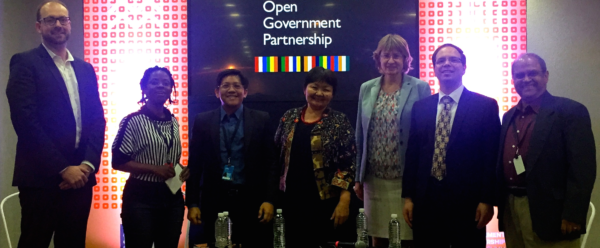
Over the last 15 years, the Partnership for Transparency Fund (PTF) has been at the forefront of innovation to improve governance, increase transparency, promote the rule of law and reduce corruption. In our goal to support developing country CSOs fighting for good governance, we have recognized the enormous opportunity that the governance sustainable development goal (SDG #16) presents for each of our partners. In response, we set out to identify how OGP experience could inform the SDGs at the 2015 Open Government Partnership (OGP) Global Summit by pulling together our partners and renowned experts to explore a mix of theory and on-the-ground experiences that can help make SDG #16 a more concrete, realizable and measurable exercise.
THEORTICAL CONTRIBUTIONS
Vinay Bhargava, PTF’s Chief Technical Officer, initiated the discussion by highlighting the substantial overlap between OGP and SDG#16. These overlaps present a good opportunity for UN member countries to gain substantive insight and reap significant savings in time and resources (human and financial) by using OGP experiences as starting point for SDG #16 action planning and advocacy. Bhargava warned, however, that while this potential exists, it us not inevitable and will require significant and concentrated coordination.
Johannes Tonn of Global Integrity provided a broad overview of OGP experiences by presenting his organization’s research comparing the results of OGP initiatives in five countries. The highly varied results of the research indicate that context, rather than process, is the most important determinant in success or failure. Tonn argued that one or a few high level commitments are unlikely to have a significant impact on country progress barring other factors. While learning from individual country experiences is valuable, and can certainly be extrapolated, there is no magic bullet that cuts across them all. Inquiring more deeply into how and why individual initiatives work may be more important than identifying a common framework for success.
Although the private sector has not been widely involved with OGP, Kim Bettcher of the Center for International Private Enterprise (CIPE), laid out a few important tenants that may help build a roadmap for future coordination. Private companies, both large and small, have an impetus for supporting good governance initiatives because it makes the business environment more predictable and fair. Yet there are rarely formal facilities to solicit their involvement. At the local level in particular, collaboration between CSOs and private companies hold the potential to be highly impactful. However, Bettcher warned that initiatives to solicit private sector involvement will require systemic frameworks to sustain long-term attention to the issue.
ON THE GROUND EXPERIENCES
The experience of OGP in Mongolia, as explained by Undral Gombodorj of the Democracy Education Center, has helped build a space for CSOs to interact with the government for greater transparency and accountability. This was primarily accomplished through the development of legislative frameworks, formal commitments to greater citizen participation, and capacity building of local CSOs. The OGP experience has not only provided a strong foundation for CSO and government collaboration to build on for SDG #16, but also highlights the positive impact of commitments on actually obtaining its objectives.
The account from Cissy Kagaba of the Anti-Corruption Coalition Uganda (ACCU) on the situation in Uganda, a non-OGP member state, was starkly different. Unlike Mongolia, channels for communication and opportunities for CSO influence on government policy are limited, especially when it comes to good governance. Although the Ugandan government has signed a pledge to work with civil society in pursuit of the SDGs, there are still a host of challenges that could easily prevent meaningful engagement. In particular, Kagaba questioned the government’s true willingness to receive CSO feedback as well as CSO capacity to make informed recommendations.
The experience of OGP in the Philippines has been mixed. According to Dondon Parafina of the Affiliated Network for Social Accountability in East Asia and the Pacific (ANSA-EAP), the most significant challenge to CSOs sustained involvement has and will continue to be funding. From his perspective, government funding to conduct this work would both widen the playing field to include a more diverse group of CSOs and set standards for higher quality results in each country specific context. Parafina also argued that the cost savings of citizen monitoring of public services is reason enough to justify government support and that both OGP and the SDGs could be important gateways to pressure governments into funding CSO social accountability initiatives.
CONCLUSIONS
Claudia Buetijen of the Asian Development Bank (ADB) closed the session with a request for more research and a call for proposals. She highlighted that theory can inform implementation, but each situation exists within its own unique context. While we may never find a “one size fits all” solution, every experience is a progressive building block to compare, contrast and ultimately inform the next action.
PTF is committed to working with our developing country partners in pursuit of developing real solutions for the achievement of SDG #16 in a variety of contexts. We’re looking to expand our partnership base with CSOs willing to share their experiences and build the worldwide momentum towards better governance. We invite you to get involved by sending us your ideas and contributions via e-mail, Facebook or Twitter.

